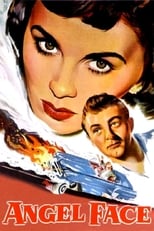John Chard
Jun 5, 2019
8/10
Never be the innocent bystander, that's the guy that always gets hurt.
Angel Face is directed by Otto Preminger and adapted to screenplay by Ben Hecht, Oscar Millard and Frank S. Nugent from a story written by Chester Erskine. It stars Robert Mitchum, Jean Simmons, Mona Freeman and Herbert Marshall. Music is scored by Dimitri Tiomkin and cinematography is by Harry Stradling.
The Tremayne residence, home to beguiling beauty Diane Tremayne (Simmons). When ambulance driver Frank Jessup (Mitchum) meets her for the first time, little did he know that he would soon be engulfed in a world of sexual desires and possible murder.
Well if it ain't the dead body jockey.
In film noir circles it's certainly well known enough, and it can count a number of big names in the movie world as its supporters, yet Angel Face still appears to be something of a forgotten treasure. It's a wickedly dark Freudian picture that pulses with impending doom, luring the viewer into its web that's been threaded together by deceit, seduction, greed and madness. The viewer is never quite sure what will out as the Diane/Frank relationship starts to form, we have a good idea that Frank is in it up to his neck, and you sense he knows it as well, but the twists and turns in the narrative keep things suspenseful; right up to the bold and black hearted finale.
The themes at work in the story are beautifully aided by two compelling central performances from Mitchum (Out of the Past) and Simmons (Elmer Gantry), the former is very restrained, muscular and on iconic cigarette smoking form, the latter is suspiciously sexy, angelic yet dangerous and exuding a poker face charm. In support Mona Freeman (The Heiress) makes good out of a too small a role as the polar opposite "other" girl. Herself gorgeous, Freeman has "safe and homely" down pat, but is that enough for our rugged Frankie Jessup? Preminger (Laura/Whirlpool) directs with professional assuredness whilst getting in tight to the actors with his camera.
Stradling's (Suspicion/A Streetcar Named Desire) black and white photography is effective in capturing the Beverly Hills locale, however, it's rarely in sync with the murky themes unfolding in the plot. Too often it's too bright, too expansive, the minimal amount of shadow play is sorely felt, particularly when the action switches to the foreboding setting of the Tremayne cliff top house. It's an itch that is inflamed still further by Tiomkin's in tune score, full of melodramatic swirls and supernatural down beats, it's a score very at one with the characters and begs for some shady photography. Still, that's me being greedy and wanting chiaroscuro in full effect, Stradling was a fine photographer and surely acted on Preminger's requests for this particular movie.
Angel Face, a moody gem of a story that's punctured by moments of violence, and featuring a cast and director on song. 8/10
